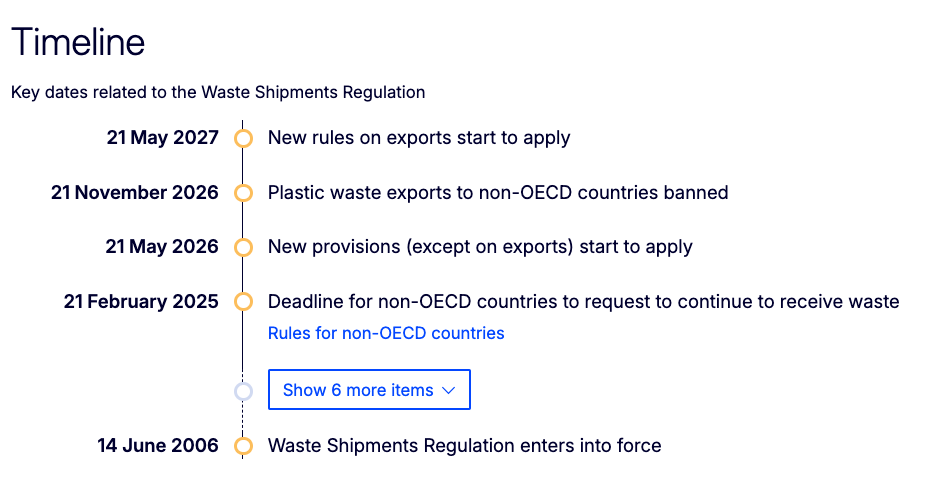In this opinion article, Cristina Vázquez, CEO of TEIMAS, shares her vision on how the new EU Waste Shipment Regulation drives transparency, digitalisation, and corporate accountability, turning waste into a strategic opportunity.
.png)
It has been over a year since the new EU Waste Shipment Regulation came into force, marking a turning point in waste management in Europe. This regulation affects both the internal transport of waste within the EU and its export and import, particularly to countries outside the OECD.
To grasp the scale of this measure, one only needs to look at the numbers. Over the past 20 years, EU waste exports to non-EU countries have increased by 72%, reaching 35 million tonnes in 2023. This highlights the need for stricter rules to ensure responsible and sustainable waste treatment.
The central aim of the regulation is clear: to ensure that waste, especially hazardous or hard-to-recycle, does not end up in countries with lower management capacity. Moreover, it requires companies to demonstrate that these materials will be properly treated wherever they are sent.
In short, the regulation is about reinforcing transparency, digitalisation, and corporate accountability, preventing Europe from outsourcing its environmental problems and wasting valuable resources.

Timeline for the Implementation of the Waste Shipment Regulation. Source: European Commission
One of the most significant changes concerns the shipment of waste to non-OECD countries. From May 2027, the export of non-hazardous waste will only be possible if the receiving countries notify the European Commission of their intention to import it and demonstrate sustainable management capacity through independent audits of treatment facilities.
On the other hand, non-hazardous plastic waste will no longer be allowed to be exported to non-OECD countries from November 2026 for at least two and a half years. After this period, these countries may resume importing plastic waste if they comply with certain rules and are positively evaluated by the European Commission.
For OECD countries, the PIC procedure (Prior Informed Consent) will apply, meaning that companies must request special authorization from both the country of origin and the destination country to ship plastic waste.
This regulatory change coincides with a transformation that deeply affects waste management: digitalisation. Today, companies understand that controlling and optimising the generation of these materials is, of course, a legal obligation, but also a strategy for environmental commitment and efficiency.
However, significant barriers still exist: data dispersion, high administrative burden, difficulty complying with the latest regulations, traceability issues, and the complexity of allocating costs correctly… Many organisations still rely on manual spreadsheets, paper documentation, and decentralised systems, which slows decision-making and limits the capacity for improvement.
The transition to digitalisation improves legal compliance on one hand and turns waste management into a strategic lever for sustainability, operational efficiency, and corporate competitiveness on the other.
Furthermore, recent European regulations strengthen the obligation for companies to know and control the destination of their waste, measure its environmental and economic impact, and digitally report all information to the competent authorities.
An example of this is DIWASS, the European Commission’s digital waste shipment platform introduced by the Waste Shipment Regulation. It will centralise the electronic submission and exchange of all notification and tracking documents, and its use will be mandatory from 21 May 2026 for all economic operators involved in shipments within the EU (producers, transporters, intermediaries, treatment facilities) as well as for Member States’ competent authorities, which will need to connect interoperably with this system.
We are entering an era in which waste is no longer a burden but an asset that generates revenue. Managing it and providing traceability opens new avenues for profit.
We are at a turning point. There will be challenges ahead, particularly in adapting to new legislation and digitalising complex processes, but the benefits – environmental, economic, and strategic, far outweigh the difficulties. It is time to take responsibility, optimise waste management, and lead by example. Europe now has the opportunity to demonstrate that sustainability and competitiveness can go hand in hand.
For more information on the Waste Shipment Regulation, you can see Cristina Vázquez’s interview for TEIMAS Talks.